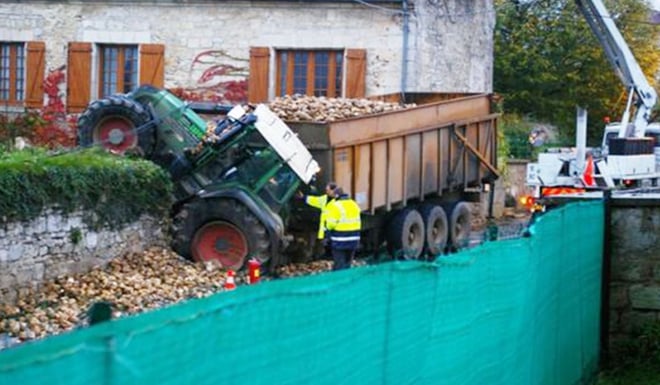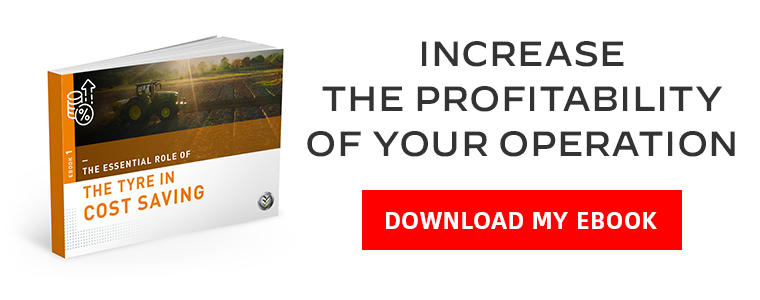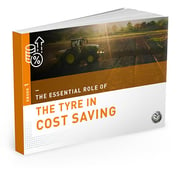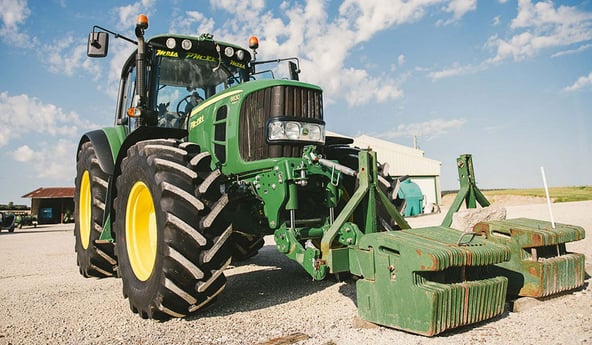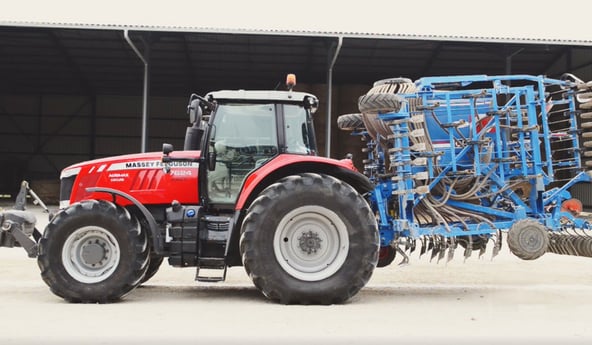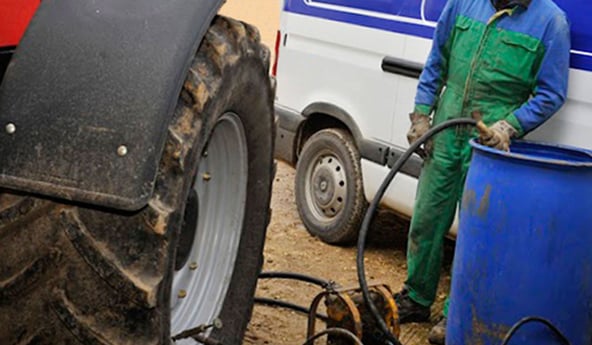Agricultural tyres are generally pretty tough and resistant to heavy loads. During harvesting for example, the tyres of your trailers carry heavy loads and your tractor, to which you add increasingly heavy tools, must be capable of handling this increased weight.
However, you must be careful never to exceed the manufacture’s recommendations, the axle load limits and the maximum loaded speed limits.
If you overload your agricultural tyres, you risk facing many problems which may affect your safety and finances to different degrees.
WHAT ARE THE RISKS AND HOW TO AVOID THEM?
1. Excessive load on your agricultural tyres can result in irreversible material damage
Over straining your tyres can cause irreversible damage.
Your agricultural tyres are the only link between your tractor and the soil. If you overload your trailer or if you install heavy mounted or semi-mounted tools, the tractor’s weight will squash the tyres. If the soil is hard, the tyre treads will fold with the traction with possible tearing. The distortion from the squashing will occur on the sidewalls which will be overexerted, you will increase the risks of internal breakage in the casing. This permanent distortion will result in you having to replace the tyre.
To avoid this strain, there is a category of low-pressure or very high flexion (VF) tyre, which is designed to carry a higher load with its high-tech, deformable casing and which is therefore much more robust than standard tyres.
When overloaded your tractor tyres will damage your soil.
The excess weight will squash your tractor tyres. By increasing the pressure, you can limit the squashing and maintain a certain balance on hard soils. However, when you drive on loose soils (wet soil, clay soil…), the soil will give way under the pressure of the tyre which will sink until the soil is sufficiency compacted to resist the tractor’s weight.
Not only will this require increased tractive force as your machinery has sunk into the soil, but it will also generate increased deep soil compaction, which will damage the root system of your plants.
Only VF tyres will enable you to increase the load while protecting the soil, as their more resistant design allows you to work at very low pressure with the tyre flattening on the soil and widening the contact surface with the ground to avoid sinkage.
Excessive load on your agricultural tyres accelerates wear and tear.
The distortion of your tractor tyres accelerates wear. If you combine an excessive load with uncontrolled tyre pressure, the tyres will wear out much more quickly.
Agricultural tyres carrying a heavy load do not wear in the same way depending on the pressure level:
- If your tyres are over-inflated with an excess towed load, they will spin, and the wear will occur particularly on the front of the lugs.
- If your tyres are under-inflated and carrying excess weight on the driving wheels, wear will occur particularly on the back of the lugs. Their mobility becomes excessive which counters the resistance of the casing. This causes excessive flexion at the base of the lugs and leads to numerous folds which will result in the tyre having to be replaced.
In the long term, you may even provoke cracks in the butyl rubber, damage to the casing or even a tyre explosion.
To avoid these risks, ideally you should have tyres which can carry a heavy load with a low tyre pressure.
Agricultural tyres with IF VF technology can carry an additional 20 to 40% compared to standard tyres, with low pressure and no adjustment.
2. Contrary to what you might think, excessive weight on your tyres will reduce your yield
If your tyres carry an excessive load but cannot work with low air pressure, they will sink into the soil, the rolling resistance increases and your work is much slower and increases your fuel consumption. Throughout the year your productivity is reduced and in the long term, repetitive compacting of the soil reduces its yield.
For example, if you don’t have a choice and if the weather conditions mean that you have to use a maximum load to save time and reduce the number of rotations to save your crops, it would be economical to invest in a new VF agricultural tyre which will enable you to work with a heavier load without damaging your equipment.
3. Excessive weight on your tyres increases the risk of accidents on the road
If you compensate for an excessive load with overly high air pressure, your tractor could overturn as you will reduce its grip. Your wheels could lose contact with the ground, especially on the road, in poor weather conditions.
Several elements can combine to cause your tractor to overturn: the total mass of your combination vehicle, the load on each tyre, the distortion of the tyre rubber from slipping on the bumps on the ground, the tyre grip and the braking power required.
Bridgestone-agriculture blog is written and administered by tractor tyre experts who are available to provide you with the advice you need about agricultural tyres. They can help you to maximise your productivity with information on all tyre related topics: agricultural tyre technical data, agricultural tyre performance, pressure advice for agricultural tyres, solutions for avoiding soil compaction, sprayer tyre pressure, Why and how to ballast your tractor tyres, 6 mechanical causes behind abnormal wear to your agricultural tyres etc.
Learn more
If you’d like to read more about the causes and consequences of overturning, download the eBook below for free:
Most people who read this article have also read some of the following articles:
- 7 keys to know the impact of ballast on agricultural tyres
- How and why to ballast your tractor tyres or agricultural tyres
- Distribution of weight: ballast with liquid in the tyres or cast iron weights
- What is the right load distribution for my tractor tyres?
- What are the disadvantages of using water ballast in tractor tyres?
- Incorrect ballasting: what are the risks for my tractor tyres
This information is intended only to make you aware of the technical and functional aspects of agricultural tires and their use. It does not allow you to make a judgment or a definitive conclusion on a given problem. Only your agricultural tire expert is able to make a technical assessment and take a final decision, case by case.
Leave a
commentary
Your email address will not be published.
Required fields are indicated with *


